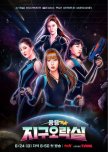
Phantom School Episode 1
0 people found this review helpful
Universe/World: I like the concept. If this was a novel, it could span 10 YA (Young Adult) novels easily. The adventure in this universe/world can be limitless, and the world can be fleshed out properly.Speaking of fleshing out, episode 1 lacks a lot of that. It was as if this series is a sequel, or not standalone. That it expected the audience to already have knowledge of it.But again, it's premier week. Still, for a show with only 8 episodes, they should be setting the universe early.Acting: 5 out of 10 as of episode 1. The first episode gave me the feels that the talents are newbies. And I think they most of them are, at least after checking some of their past works listed here in MDL.Directing/scenes: 6.5 out of 10. Needs more work. It seems like the show is being directed by a high school. They know what they want, but they are failing to capture the scene they have in mind.Some weirdness in script: In the gym fight, the guy who went to the rescue of the FL acted as if he knows the real identity of the FL and have an idea on what's happening.1. He was immediately on the offensive against the possessed student. No questions asked, just like that, he's flying for a punch.2. When the FL summoned her weapon, and called his attention, he did not question why she's holding a weapon, and what she's about to do.No ordinary student would act that way unless they too are a Phantom Hunter, or have knowledge of them.If he is just an ordinary guy…3. He never acted worried at all that the FL is “going to kill” their classmate, over for what? Defeating the bully?Their classmate never did anything, as far as the gym scene is concerned, that would warrant getting stabbed by a spear. Yet, he just let the FL do it, no questions asked.So, let's hope he is not an ordinary guy, and he does know something about what's going on. (After all, he did see the 7 orbs flying.)
Was this review helpful to you?

The Law Cafe Episode 15
0 people found this review helpful
The show was doing good until episode 15.They were at the last leg of the story. All they have to do is to end it properly.But no, they messed it all up in episode 15.The sad thing about this? Episode 15 killed the entire series.Endings are very important because whatever other flaws a show have in the earlier episodes, the ending can give the show justice and leave the audience with a memorable experience.But messing the finale two episodes can ruin a show that had an excellent run.Look at all the other shows, not just in K-drama land, but in other regions. A show that started to receive lower ratings, if given a proper ending or a bang, made wonders to the entire series.Even in comics/webtoons/manga/manhwa, even in literary fiction. Endings are critical, mess it up and the entire story is ruined. Do it right and it can save everything.Unfortunately, episode 15 of The Law Cafe, did their best to ruin the entire show.SKIP this episode if you still can.
Was this review helpful to you?

One Dollar Lawyer Episode 4
0 people found this review helpful
I love how they exposed the biases of the lawyer/prosecution "industry" in episode 4. It happens in real life and in many countries, if your case is despicable, even demonic -- for example children killing their parents; or an adult raping/killing a kid or a baby -- every one will judge you as guilty, no one will bother trying to find the truth even if the is lack of evidence.Your Human Right as "innocent until proven guilty" is thrown out the window. The media, and the people posting in SNS, already have a guilty verdict against you. Which indirectly affects the case whether we like it or not.It's really sad that this thing is still happening and it is very scary to be placed in this situation. If you don't have the means to hire the best of the best of the best attorney, you might as well lie and admit you did it and hope for a lowered sentence.Years later, even if the real suspect is caught, not one person, not the faulty system, no media, no keyboard warrior, will apologize to you. They won't even bother in helping you get back on your feet. The least they could do is to make a public apology but no, no one will do that. And the system, like the police and the prosecution, will only do a lip service to save face.So 10/10 for this episode for exposing how bad our society has become.
Was this review helpful to you?

Today's Webtoon Episode 9
0 people found this review helpful
I love the contrast in each episode. A story about an artist and how it is an opposite in one of the characters, especially Ma Eum's story. In each episode we are given the two sides of the same coin, and it leaves something for the audience to consider and think about.For example, in episode 9, a father who learned to accept the reality that the past glory is gone and he should face reality. People remembers him for that and by not giving up, trying to repeat his past success, he runs the risk of that past glory being replaced with something very bad -- not taking care of his daughter.Meanwhile, Ma Eum's father is deadset on having his way. Of getting an Olympic Medal, to the point that he refused to accept the peace offering of his daughter.One daughter finally have peace with her father. While another daughter is still living in a battle zone with her father.There are also similarities. Both fathers see their profession as their life's work and identity. It is who they are. It is what they know. It is their profession. Without it, they are nothing.But one father finally realized that his masterpiece is his daughter who he has neglected. While the other father still has not seen his daughter as his "Olympic gold medal".Two different father-daughter relationships. Two different fathers. Two different daughters. Two different scenarios. But at the bottom of these two stories, they're not actually different … they're the same. (1) The dream of the fathers; and (2) the love between father and daughter.There are so many things we can get out of this episode. There are many differences and similarities. There are a lot of lessons embedded. And this is just about the father, the daughter, and the father-daughter relationship.I love it. I so love it.
Was this review helpful to you?

The best episode so far. I love it. Hahaha. I hope the next episodes are as fun and hilarious as this one. I never laughed for an hour and half for years. The best!
Was this review helpful to you?

Extraordinary Attorney Woo Episode 1
0 people found this review helpful
Summary: So far, the writer and director got everything correctly and there were no exaggerated/sensationalized scenes re: autistic and autism, in general or otherwise.My hopes are high they will maintain this "pureness" instead of adding things that does not represent us autistics.-------EDIT:Apologies for the "feeling normal and superior". I just hate the word "normal" when it comes to autism discussion because "normal" is relative (and in this subject, the majority). But I have to explain what "neurotypical" is without implying that "normal" is "normal".It has no other meaning other than being the "majority". Think of it this way, if the situation is reversed wherein autistics are the majority of the population, "normal" would mean the autistics.-------Detailed feedback:1. The kid moving (or hopping a little) left and right at a stationary position.Accurate. I do that myself. Other autistics do it differently, like swaying forward and backward (which I sometimes do myself).This is the first time I saw this depicted in a show. Usually they use "murmurs", when an autistic talks to himself/herself; or scratches their arms. While there are autistics who do that, it is not always the case.Kudos to episode 1 for showing a different one.2. Having a lot of pillows (or anything soft) at bed.Yet another trait rarely seen in shows. The most common depiction is having a lot of toys or a thick blanket (and they even use the wrong type of blanket!) In episode 1, they decided to depict the less seen in a show, lots of pillows.While many autistics prefer weighted blankets or sensory blankets, not everyone does. Some simply prefer to have a lot of soft things around them.Again, kudos for choosing to show this instead of the overly used toys and incorrect blankets.3. Sensory overload or sensory sensitivityThey did well in expressing sensory overload or sensory sensitivity in a simple, natural way. These are:- wearing of ear plugs (waking up scene)- taste sensitivity (breakfast scene)- too much awareness of one's surroundings (train scene)Most of us autistics have varying degrees of sensory sensitivity, and when there is simply too much, we enter into sensory overload situation.For example, in the train scene, the crowd and the nearness of people creates a sensory overload. There are different ways that we autistics cope with it and if we fail at that … we need to run as far away from the crowd, the noise, and everything else, otherwise we're going to have a meltdown -- by that it means, our energy will be completely drained.In the train scene, the character's way of coping with it is to listen to whale sounds. This is actually a common coping mechanism: draining one's senses of something to help tune out everything else. For example, one of my coping mechanism is to fill my thoughts with a particular problem that is not easy to solve. Or, if I am with someone, I will keep on talking about "senseless" things to help me drown out everything else.We even get irritated at small sounds most non-autistics can not hear. I hate those small sounds myself, it can wake me up too, but most people don't hear it.4. Seeing things non-autistic people doesn't see/hearOoh, I love this one. Almost all neurotypicals (a.k.a. "feeling normal and superior") fail to see things already right in front of their faces. Almost all austistics see what you can not see.This was perfectly exemplified with that iron that does look like a whale. At first it was meaningless but later in the case, it was a stepping stone which led to the solution.That is accurate. And because we see (and hear) a lot of things, it is one reason why we experience sensory overload. (Yeah it's interconnected.)5. Ways to brace oneself before doing something a person doesn't normally do; or something challengingIn the show, this was depicted as counting down before entering her supervisor's office. It's like preparing herself for something. Taking a deep breath. Getting her nerves ready.This is a common trait amongst us autistics, although in varying degrees. If an autistic can not find a way to cope up with this, it practically paralyzes us from doing anything.For example. Neurotypicals (a.k.a. "feeling normal and superior") gets nervous when going in interviews.Many autistics don't just get nervous. It's like pushing a huge rock uphill for many of us. It usually starts with applying. It's too hard to send our CV because we already know (1) they are going to call us (which many of us hates); (2) we have to shake hands (which many of us hates); (3) we have to make eye contact (which again many of us hates); (4) when we arrive at the interview schedule, they'll make us wait (which we hate big time); and the list goes on. So, if we can't push ourselves to do it, it paralyzes us.In the show, the character also observed (hospital scene) first before meeting them. It helps in preparing herself and to anticipate things, then took a deep breath. For non-autistics, they'll dismiss it as "she's bracing herself because she knew the husband and was afraid of him". Maybe, maybe not. Personally, I'm more inclined that she was not afraid of him … at all. She knew she might lose it once the husband starts his tirade.6. EcholaliaWhenever this is depicted in a show, it usually is presented as something annoying, bad, evil, and rude. In this particular show, I like how they did not do that. They turned it into something light, something people noticed but did not make a huge fuss about it.In the court scene, they even made it a little comedic scene because the judge answered back after she repeated what he said. In other shows, they'll probably have the judge reprimand her and probably ask for her dismissal for making his court a monkey court.7. Doesn't want to be touched and huggedThis is very true with almost all autistics, and often this is depicted wrongly and in a very bad way in shows where there is an autistic character.It is not so much about personal space, as neurotypicals (a.k.a. "feeling normal and superior") argue about, it is about sensitivities. Yes, we do care about personal spaces but that isn't our primary concern why we don't want to be touched and hugged without our permission. Again, take note, without our permission.For some autistics, they have touch sensitivities and if you do not inform them beforehand, it may (or may not) cause a serious spike or energy drain.For some autistics, they have sensitivities on bacteria and germs. Take note: not because you have this sensitivity does it mean you are autistic; no not all. However, this is also a common trait for some autistics.For some autistics, they highly value boundaries. Usually at work and at home, you'll see this trait reflected as well … there are literal and non-literal boundaries.So, if you know a person is autistic, do not touch them nor hug them without their permission. If they say no, don't take it personally, it has nothing to do with you, it has to do with them.If you do not know if a person is autistic and they reacted in a way that YOU think was rude or YOU think you offended them, again do not take it personally. They probably are autistic and doesn't feel comfortable in disclosing it. Again, it is NOT about you.8. Disclosing that one is in the Autism SpectrumNow, many neurotypicals (a.k.a. "feeling normal and superior") whine about "it's not our fault, if they disclosed they are autistic then we would not have acted that way". F**king seriously?What this tells us is that you'll give us a fake you just because you know we are autistic. And then later, when you get tired, you will still blame us and hope we disappear from your life -- or if you decide to move/resign, you'll blame us and speak about us to people we do not know.This is one of the many reasons why many of us do not disclose that we are autistic. Many people starts to act fake just because. It is as if we have an infectious disease.There is prejudice against autistics. In the show, I was afraid they'll turn the court into something against autistics, with the challenges the autistic attorney is facing, the judge could have said, "replace her, she's turning my court into a joke and she's taking too much time". (I'm they did not do that.)9. Autistics doesn't have feelings, emotions, sympathy, and empathy.A common false misconception thanks to psychologists. This is NOT true.We do have feelings, emotions, sympathy, and empathy, we just process and express it in a different way neurotypicals (a.k.a. "feeling normal and superior") does not understand or refuses to acknowledge.In the show, this was expressed in the hospital scene where the autistic attorney dissected "love". That short talk enabled her to stand firmly on the case for her client because she understood her client loves her husband. That is how we usually process and express it.10. Fascination with one particular subject. In the show, it's whales.This is true. If someone you know is autistic (diagnosed; not diagnosed; unknown) fascination with one particular subject is a very common trait. We know almost everything about a subject we focus on. In the show, the autistic attorney's favourite subject are whales.So … if you are non-autistic, understand this trait.---I'll end with #10, there are more but it's too long now.
Was this review helpful to you?

This episode tackles the very serious cancer of pornography, especially those which were secretly filmed without the knowledge of the victim. It also exposes the loopholes in the laws in different countries when it comes to taking down these videos and bringing to court those that hosts and manages these websites.If the team of Taxi Driver is real, there is no doubt a lot of guilty suspects and companies would have been dead by now.
Was this review helpful to you?

L.U.C.A.: The Beginning Episode 8
0 people found this review helpful
It was going very well for a full 10 stars until the last few scenes where she made a call knowing full well it can be traced back to her. There are a hudred ways to lead the "bad guys" to her without making her the dumbest experienced detective in the world.
Was this review helpful to you?

Lovestruck in the City Episode 14
0 people found this review helpful
Perfect episode. Reminded me of the past too.It is however sad that very few people understood this episode--and the whole series for that matter. In this episode, the subject was Lee Eun Oh's fear. They showed it to us through their encounter in this episode--which mind you, happens in real life.What is her fear? Well, you have to watch from episode 1 again if you missed it.
Was this review helpful to you?























